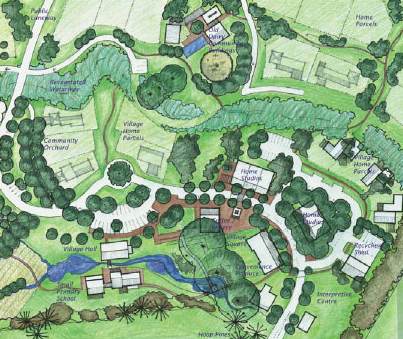
Infrastructure will service and inter-connect private members’ areas and guest or public areas. Settlement Image ~ Conceptual only
TRANSPORT
Within the settlement car movements will be kept to a minimum and be speed-limited. Walkways, bicycles and electric vehicles will be encouraged for internal transport. Consideration will be given to cost, toxicity and necessity of dirt, gravel or bitumen. There will be a pool of communal vehicles for external use and specified car parking areas.
WATER
Of high priority in our vision is permanent running, abundant and good quality water for supply and recreation. The land that Kanjini Co-Op has purchased has a large existing lake and also the potential for the construction of dams.
A gravity fed reticulation system is preferred, where pumping is necessary alternatives to petrol pumps will be given priority. Additional water may be obtained from springs, bores, and rainwater tanks. Water conservation and waste water management incorporating a natural grey water treatment system will also be prioritised.
To enhance the aesthetics of the settlement water features will be included. Consideration will be given to harvesting and selling of excess water.
Hot Water
Top of the list are solar hot water systems combined with rock filled underground tanks for long term heat storage. Other options include thermal bores, parabolic mirrors, and back-up hot water systems attached to slow combustion stoves.
WASTE & RECYCLING
It is envisaged that waste will be recycled as much as possible and that there will be minimal non-organic waste. Glass and metal can be melted and reused using the technology of a parabolic mirror. Paper and cardboard can be used for making new paper products, used in biogas plants or fed to worms. Plastic use will be discouraged as will one way batteries. Rechargeable batteries and dynamos will be encouraged as well as a willingness to embrace new green technologies.
High quality long life products will be considered over cheap short lasting ones.
Organic waste will be utilised as much as possible by composting, feeding worm farms, producing biogas etc.
ELECTRICITY
We envisage to be independent of the grid. Electricity will be generated by renewable energy systems including solar, hydro, wind, parabolic mirror, and other renewable sources. There will be a central system as well as individual ones utilising several different power sources.
We will be encouraging electricity conservation by using energy saving light bulbs; sensors and dimmers; low wattage appliances and maximum use of natural lighting.
Preference to an underground power system will be given subject to considerations of economics and appropriateness.
Apart from household and industrial use the electricity generated can be used to run electric vehicles and machinery as well as whatever other alternative options our creative thinking can come up with. Excess can be stored and possibly sold.
We will remain open to new developments in the field of energy generation including the use of wind to compress air to drive tools, a generator and/or vehicles.
back to TopHOME VISION Co-Op FAQ's Relating Contact Us
LAND BUILDINGS INFRASTRUCTURE AGRICULTURE ECONOMICS TECHNOLOGY HUMAN INTERACTION COOPERATIVE